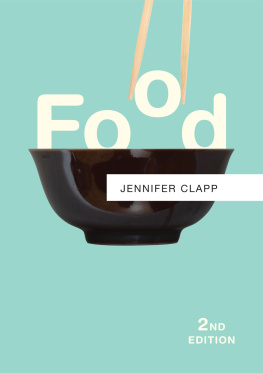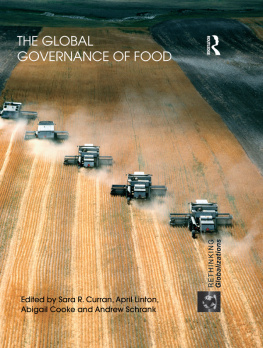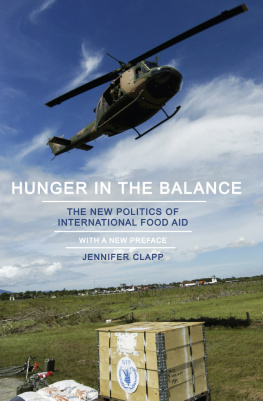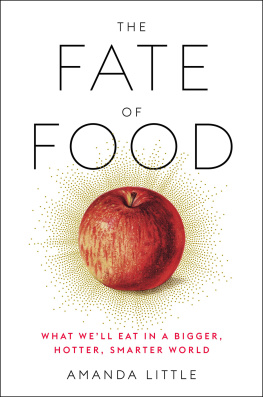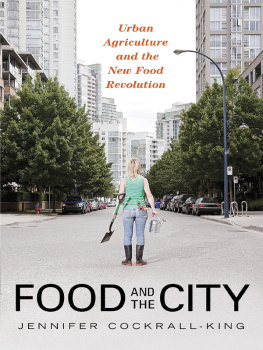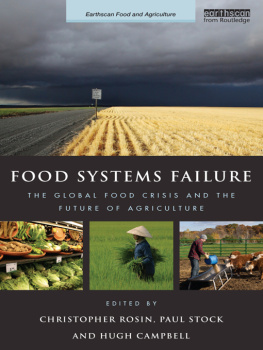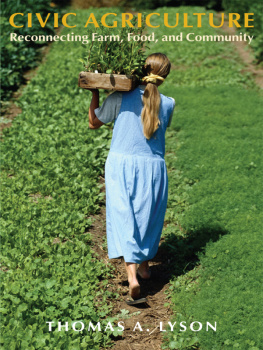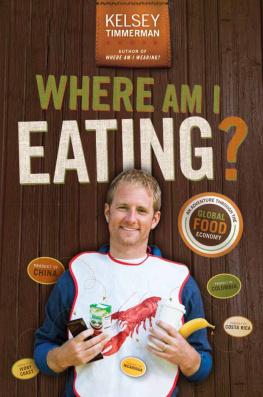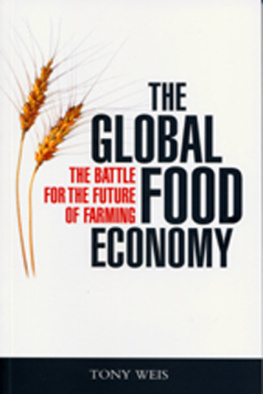Contents
List of Figures
List of Tables
Guide
Pages

Resources
Peter Dauvergne and Jane Lister Timber
Michael Nest Coltan
Elizabeth R. DeSombre and J. Samuel Barkin Fish
Jennifer Clapp Food
David Lewis Feldman Water
Gavin Fridell Coffee
Gavin Bridge and Philippe Le Billon Oil
Derek Hall Land
Ben Richardson Sugar
Ian Smillie Diamonds
Food
Second edition
JENNIFER CIAPP
polity
Copyright Jennifer Clapp 2016
First edition published in 2012 by Polity Press
This edition published in 2016 by Polity Press
The right of Jennifer Clapp to be identified as Author of this Work has been asserted in accordance with the UK Copyright, Designs and Patents Act 1988.
First published in 2016 by Polity Press
Polity Press
65 Bridge Street
Cambridge CB2 1UR, UK
Polity Press
350 Main Street
Malden, MA 02148, USA
All rights reserved. Except for the quotation of short passages for the purpose of criticism and review, no part of this publication may be reproduced, stored in a retrieval system, or transmitted, in any form or by any means, electronic, mechanical, photocopying, recording or otherwise, without the prior permission of the publisher.
ISBN-13: 978-1-5095-0083-3
Library of Congress Cataloging-in-Publication Data
Names: Clapp, Jennifer, 1963- author.
Title: Food / Jennifer Clapp.
Description: Second edition. | Cambridge, UK ; Malden, MA : Polity Press, 2016. | Includes bibliographical references and index.
Identifiers: LCCN 2015036934| ISBN 9781509500796 (hardback : alk. paper) | ISBN 9781509500802 (pbk. : alk. paper)
Subjects: LCSH: Food supply--Economic aspects. | Agriculture--Economic aspects. | Agricultural industries.
Classification: LCC HD9000.5 .C545 2016 | DDC 338.1/9--dc23 LC record available at http://lccn.loc.gov/2015036934
The publisher has used its best endeavours to ensure that the URLs for external websites referred to in this book are correct and active at the time of going to press. However, the publisher has no responsibility for the websites and can make no guarantee that a site will remain live or that the content is or will remain appropriate.
Every effort has been made to trace all copyright holders, but if any have been inadvertently overlooked the publisher will be pleased to include any necessary credits in any subsequent reprint or edition.
For further information on Polity, visit our website:
politybooks.com
To my parents, John and Judith Clapp, for their love, support and encouragement.
Acknowledgments
I owe enormous gratitude to many people for their assistance and support as I wrote this book and updated it for the second edition. Special thanks go to Taarini Chopra, Brittney Martin, Rachel McQuail, Linda Swanston, and Tomas Szuchewycz who provided outstanding research assistance. I owe a great debt to Peter Dauvergne for reading the first draft of the manuscript and providing exceptionally perceptive comments. For very helpful discussion of ideas and positive encouragement during the course of writing and revising, I am also grateful to Kim Burnett, Taarini Chopra (again), Derek Hall, Eric Helleiner, Sarah Martin, Sophia Murphy, Theresa Schumilas, Simron Jit Singh, and Phoebe Stephens. My children, Zoe and Nels, deserve a medal for listening to me go on about the world food economy at the dinner table and for letting me work long hours to complete both editions of this book. Nels Helleiner also helped with some of the graphics. I would also like to thank the anonymous reviewers for their constructive and insightful feedback and suggestions. For their enthusiasm and for shepherding this project through the publication process, I am grateful to Louise Knight, David Winters, Pascal Porcheron, Nekane Tanaka Galdos, Clare Ansell, and Susan Beer at Polity Press. And last, but not least, I also owe thanks to all of my foodie students for their inspiration over the years the ideas we discussed in the various versions of food and agriculture-related courses I taught at both Trent University and the University of Waterloo over the past decade and a half have had immeasurable influence on my thinking and analysis on this topic. I take sole responsibility for any errors or omissions.
Waterloo, Ontario
Abbreviations
ADMArcher Daniels MidlandAGRAAlliance for a Green Revolution in AfricaAoAUruguay Round Agreement on AgricultureBIOBiotechnology Industry OrganizationCAPCommon Agricultural PolicyCFSUN Committee on World Food SecurityCFTCCommodity Futures Trading CommissionCGIARConsultative Group on International Agricultural ResearchCIFCommodity Index FundCIMMYTInternational Maize and Wheat Improvement CenterCRConcentration RatioCSRCorporate Social ResponsibilityECEuropean CommunityETCErosion, Technology, and Concentration GroupEUEuropean UnionFACFood Aid ConventionFAOFood and Agriculture OrganizationFDIForeign Direct InvestmentFIANFoodFirst Information and Action NetworkFLOFairtrade Labelling OrganizationG8Group of Eight (leading economies)G20Group of Twenty (leading economies)G- 20WTO Group of 20 (agriculture)G- 33WTO Group of 33 (agriculture)GAFSPGlobal Agriculture and Food Security ProgramGATTGeneral Agreement on Tariffs and TradeGDPGross Domestic ProductGMGenetically ModifiedGMOGenetically Modified OrganismIADPIntensive Agricultural Development ProgramIATPInstitute for Agriculture and Trade PolicyIFADInternational Fund for Agricultural DevelopmentIFIInternational Financial InstitutionIFPRIInternational Food Policy Research InstituteIMFInternational Monetary FundIPCInternational Planning CommitteeIRRIInternational Rice Research InstituteLDCsLeast Developed CountriesNAFTANorth American Free Trade AgreementNAMANorth American Millers AssociationNGONon-Governmental OrganizationODAOfficial Development AssistanceOECDOrganisation for Economic Co- operation and DevelopmentOPECOrganization of Petroleum Exporting CountriesOTCOver- the- CounterPANPesticides Action NetworkPLPublic LawPPPPublicPrivate PartnershipPRAIPrinciples for Responsible Investment in AgriculturePRIAFSPrinciples for Responsible Investment in Agriculture and Food SystemsRSPORoundtable on Sustainable Palm OilRTRSRoundtable on Responsible SoySAPStructural Adjustment ProgramSDTSpecial and Differential TreatmentSPSpecial ProductsSPSAgreement on the Application of Sanitary and Phytosanitary MeasuresSSMSpecial Safeguard MechanismTNCTransnational CorporationTRIPSTrade Related Intellectual Property Rights AgreementUNUnited NationsUNCTADUnited Nations Conference on Trade and DevelopmentUSAIDUnited States Agency for International DevelopmentUSDAUnited States Department of AgricultureUSTRUnited States Trade RepresentativeVGVoluntary Guidelines on the Responsible Governance of Tenure of Land, Fisheries and Forests in the Context of National Food SecurityWARDAWest African Rice Development AssociationWFPWorld Food ProgrammeWTOWorld Trade Organization
CHAPTER ONE
Unpacking the World Food Economy
Pause for a minute to reflect on how much you know about the path followed by the food you ate this morning as it made its way to your breakfast table. Of course your understanding and knowledge depends very much on what exactly you had to eat. Some may know almost every detail of the production, transport, processing, and exchange relationships involved in the preparation of that meal particularly those who choose to consume foods such as fresh eggs and strawberries from a local organic farm or ethically traded shade-grown coffee from Nicaragua. Others may know very little, especially when they consume pre-packaged and highly processed foods like frozen waffles or instant hot chocolate. These latter items, most likely purchased from a neighborhood supermarket, made their way to your table after a long and winding journey through the global industrial food system. Most of us probably have a vague idea of our foods origins and travels, as well as the power relationships that might be associated with it along the way, but we are not 100 percent sure.

